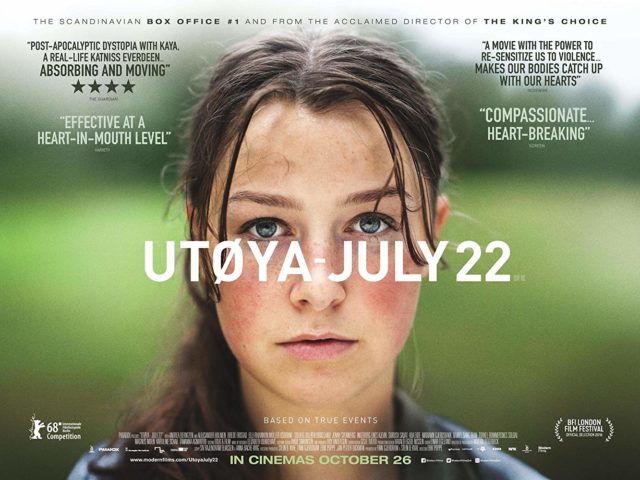Utøya 22. juli, directed by Erik Poppe, Norway 2018, showing at the London Film Festival, 12th and 13 October.
Review by Dr Khalid Ali, Film and Media Correspondent.

In July 2011, a far-right extremist, Anders Behring Breivik, brought Norway to a state of national mourning. After setting off a bomb in government headquarters in Oslo, Breivik took a ferry boat to Utøya (an island 400 kilometres northwest of Oslo). Utøya hosted a summer camp for children belonging to the youth section of the ruling Labour Party. Upon arriving on the island, Breivik went on a killing spree. Several casualties died immediately, some pretended to have died, while others fled the scene hiding in water, or in nearby caves. The atrocious attack claimed sixty nine lives.
Reconstructing the Utøya massacre, Poppe uses a fictional character, Kaja (Andrea Berntzen) to tell the horrid story from a uniquely personal angle. Kaja is a young girl who lost her little sister during the commotion. After witnessing the tragic loss of innocent lives, Kaja tries desperately to save other traumatized kids. The film narrative unfolds in real time showing humanity threatened with ignorance and brutality alongside brave acts of selflessness and sacrifice. Poppe makes a conscious decision to keep the perpetrator a faceless character in the background, while urging viewers to fully engage and empathise with Kaja’s predicament, and her heroic stance.
Over the past 20 years Erik Poppe, director and screen writer, has become the ‘Master chronicler of Norwegian cinema’ by focussing on authentic stories of Norway’s modern state in his Oslo-based film trilogy Schpaaa (1998), Hawaii, Oslo (2004), and Troubled Water (2008), as well as showcasing Norway’s brave response to German threat in World War 2 in The King’s Choice (2016).
It is worth noting that Norway was a pioneer in establishing a branch of mental health and traumatic stress studies referred to as ‘Disaster psychiatry’; the term was coined down by the ‘Board of Norwegian Doctors of 1957’ led by Professor Leo Eitinger (Malt & Weisaeth). With Professor Arne Sund’s appointment in 1978, Norway was the first country in the world to hold a ‘University chair of Disaster Psychiatry’. It is unsurprising then that the immediate and delayed psychological sequelae of the Utøya terrorist attack were captured in a seminal study (Bugge et al). Three hundred and twenty five survivors were interviewed using specific questionnaires to assess post-traumatic stress reactions (PTSR) at 4-5 months, and at 14-15 months after the catastrophic attack. Several factors were shown to be significantly associated with PTSR: higher levels of exposure to peri-traumatic events, loss of close friends, female sex, and having a non-Norwegian background. It was no coincidence that Poppe chose Kaja, a young girl as his protagonist, to convey the real life experience of those most-traumatized by the attack, namely young girls. The peripheral characters in the film are carefully selected to represent another generation of youths; a Muslim teenager of non-Norwegian origin voices his fears of impending ‘Islamophobia’ when the early signs of the terrorist attack unravelled.
The Utøya massacre is an example of ‘collective trauma’ where adverse psychological effects are shared by a group of people. By focussing on Kaja, ‘Utøya- July 22’ reminds the audience that the survivors of terrorist attacks should never be forgotten, and that their mental and psychological rehabilitation should be a national priority.